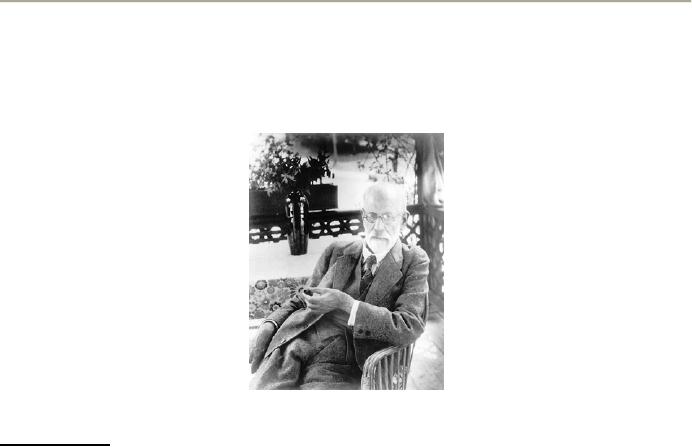 |
SIGMUND FREUD AND THE PSYCHOANALYTIC MOVEMENT:The Superego |
| << SCIENTIFIC LOOK AT MENTAL ILLNESS:Philippe Pinel, Sameul Tuke |
| SIGMUND FREUD AND PSYCHOANALYTICAL MOVEMENT:Anna Freud >> |

History
and Systems of Psychology
PSY502
VU
Lesson
29
SIGMUND
FREUD AND THE PSYCHOANALYTIC
MOVEMENT
Sigmund
Freud (1856-1939)
Sigmund
Freud
Sigmund
Freud was and Austrian
psychiatrist who was born in
1856 and died in 1939. He
worked at Vienna
and
later in England. He is the inventor of
psycho-analysis as a method of treatment.
Born in Moravia, he
lived
most of his life in Vienna,
receiving his medical degree
from the Univ. of Vienna in
1881.
Freud
was a doctor, writer,
researcher and a professor.
When Freud graduated from the
medical school and
started
doing research that was the
time when hypnotism was a prevalent
method of treatment of mental
disorders.
He was impressed with works
of Charcot, using hypnotism. Working
with Joseph Breuer he
saw
the
advantages and disadvantages of
hypnotism as a method of
treatment.
His
medical career began with an
apprenticeship under J. M. Charcot in
Paris, and soon after his
return to
Vienna
he began his famous
collaboration with Josef
Breuer on the use of hypnosis in the
treatment of
hysteria.
Based
upon his practice, he
formulated the concept of unconscious
mind and its role in
creating mental
diseases.
Freud discovered the unconscious
functions of mind which
according to him were
responsible for
mental
diseases.
Freud
also thought that the parts
of the mind play a dominant role in
creating mental diseases. He
gave the
parts
of mind as follows:
Id
The
Id is the irrational and emotional
part of the mind. At birth a
baby's mind is all Id
want, want, want.
The
Id is the primitive mind. It contains
all the basic needs and
feelings. And it has only
one rule--the
"pleasure
principle": "I want it and I want it all
now".
Ego
The
Ego functions with the
rational part of the mind.
The Ego develops out of
growing awareness that
you
can't
always get what you want.
The Ego relates to the real
world and operates via the
"reality principle".
The
Ego realizes the need for
compromise and negotiates
between the Id and the Superego.
The Ego's job
is
to get the Id's pleasures
but to be reasonable and
bear the long-term consequences in
mind. The Ego
denies
both instant gratification and pious
delaying of gratification.
66
History
and Systems of Psychology
PSY502
VU
The
Superego
The
Superego is the last part of the
mind to develop. It might be called the
moral part of the mind.
The
Superego
becomes an embodiment of parental and
societal values. It stores
and enforces rules. It
constantly
strives
for perfection, even though this
perfection/ideal may be quite
far from reality or possibility.
Its
power
to enforce rules comes from
its ability to create
anxiety.
The
Superego has two subsystems:
Ego Ideal and Conscience.
The Ego Ideal provides rules
for good
behavior,
and standards of excellence
towards which the Ego must
strive. The Ego ideal is
basically what
the
child's parents approve of or value. The
Conscience is the rules about what
constitutes bad
behavior.
The
Conscience is basically all
those things that the child
feels his or her parents
will disapprove or punish.
According
to Freud, all human beings develop
psychologically and during this
process they pass
through
different
stages of psycho-sexual development. He
said that the unconsciousness
expresses itself in
mental
symptoms,
dreams and psychopathology of everyday
life. He developed the theory of psycho-pathology
of
everyday
life. Slips of tongue, slips of
memory etc. are
representative of psychopathology of everyday
life.
He
developed the theory of interpretation of
dreams. He explained dream work in
terms of: Manifest
Contents;
Latent Content, Displacement,
Condensation, Symbolism
etc.
67
Table of Contents:
- INTRODUCTION:Methodology, Grading, Course Overview up to Midterm
- ANCIENT GREEK PHILOSOPHY/PSYCHOLOGY:Socrates, Plato
- GREEK THINKERS:Aristotle, Contiguity, Contrast
- PSYCHOLOGY IN THE 5TH TO 12TH CENTURY:Saint Augustine, Avicenna
- PSYCHOLOGY IN THE 5TH TO 12TH CENTURY:Al-Ghazali, Ibn-Rushd, Averroes
- RENAISSANCE:Rene Descartes
- ASSOCIATIONISTS:Thomas Hobbes, John Locke
- ASSOCIATIONISTS:David Hume, FRENCH REVOLUTION, Denis Diderot
- GERMAN CONTRIBUTION:Wilhelm Liebniz, Immanuel Kant, Friedrich Hegel
- INDUSTRIAL REVOLUTION:RUSSIAN CONTRIBUTIONS
- RUSSIAN CONTRIBUTIONS:Ivan Pavlov, Reflex, Acquisition
- RUSSIAN CONTRIBUTIONS:Vladimir Bekhterev
- IMPACT OF PHYSICAL SCIENCES ON PSYCHOLOGY:Charles Darwin, Gustav Fechner
- STRUCTURALIST SCHOOL OF PSYCHOLOGY:Wilhelm Wundt
- FUNCTIONALISM:William James, John Dewey
- EUROPEAN FUNCTIONALISTS:David Katz, Edgar Rubin, Jean Piaget
- BEHAVIORISM:Edward Lee Thorndike, Law of belongingness
- BEHAVIORISM:Albert Weiss, Edwin Holt, Learning, Canalization, Walter Hunter
- BEHAVIORISM:J.B.Watson
- NEO-BEHAVIOURISTS:Clark Hull, Edward Tolman, Edwin Gutherie
- NEO-BEHAVIORISTS:B.F. Skinner, Karl Lashley, Donald Hebb, Hobart Mowrer
- GESTALT PSYCHOLOGY:Max Wertheimer, Similarity, Proximity, Closure
- GESTALT PSYCHOLOGY:Wolfgang Kohler, Kurt Koffka, Edward De Bono
- GESTALT SCHOOL AND DYNAMIC PSYCHOLOGY:Kurt Lewin, DYNAMIC PSYCHOLOGY
- HISTORICO-EVOLUTIONARY PSYCHOLOGY:Leon Vygotsky, Sergei Rubenstein
- HISTORICO-EVOLUTIONARY PSYCHOLOGY:Alexei Leontiev, K.M Bykov
- SCIENTIFIC LOOK AT MENTAL DISORDERS
- SCIENTIFIC LOOK AT MENTAL ILLNESS:Philippe Pinel, Sameul Tuke
- SIGMUND FREUD AND THE PSYCHOANALYTIC MOVEMENT:The Superego
- SIGMUND FREUD AND PSYCHOANALYTICAL MOVEMENT:Anna Freud
- CARL JUNG AND ANALYTICAL PSYCHOLOGY:Carl Gustav Jung
- JUNG’S ANALYTICAL PSYCHOLOGY:Carl Gustav Jung
- ALFRED ADLER AND INDIVIDUAL PSYCHOLOGY:Alfred Adler
- NEO-FREUDIANS:Harry Stack Sullivan, Karen Horney
- NEO-FREUDIANS:Karen Horney, Erich Fromm
- ERIKSON and MORENO:J.L. Moreno, Protagonist, Audience, Role playing
- HUMANISTIC PSYCHOLOGY:Abraham Maslow, Carl Rogers, Positive Psychology
- MODERN TRENDS IN PSYCHOLOGICAL TREATMENT
- MODERN TRENDS IN PSYCHOLOGICAL TREATMENT:Biological Approaches
- ANTI-PSYCHIATRY MOVEMENT:D.L. Rosenhan, R.D. Laing, Aaron Esterson
- PSYCHOLOGY IN THE THIRD WORLD:Frantz Fanon
- PSYCHOLOGY IN THE THIRD WORLD CHINA AND PAKISTAN
- PSYCHOLOGY IN THE 21st CENTURY
- PSYCHOLOGY IN THE 21ST CENTURY:Consumer Psychology
- PSYCHOLOGY IN THE 21ST CENTURY:Sports Psychology, Positive Psychology